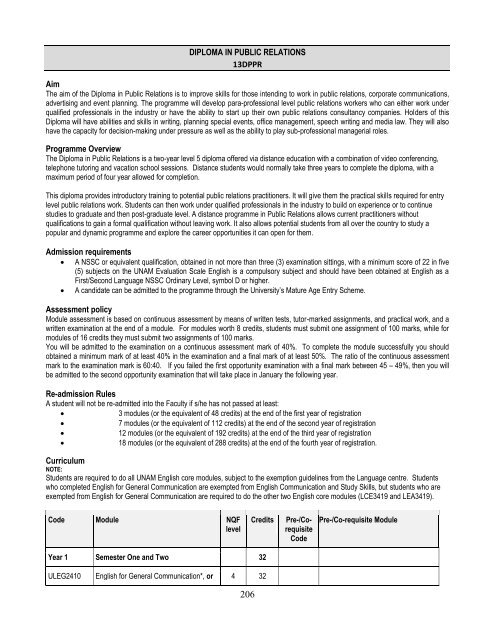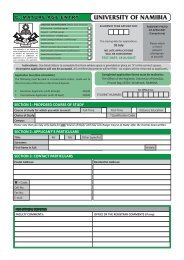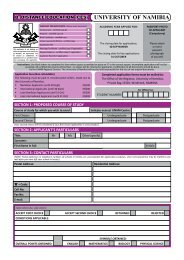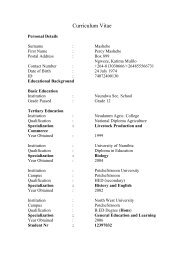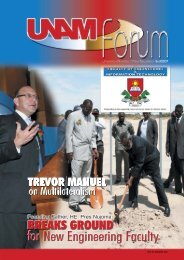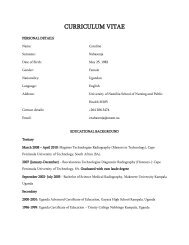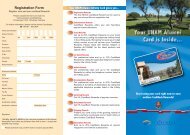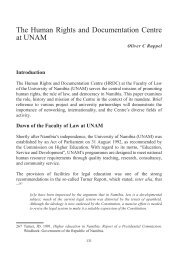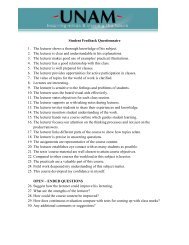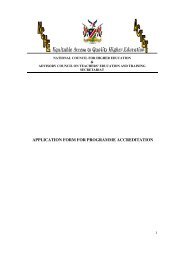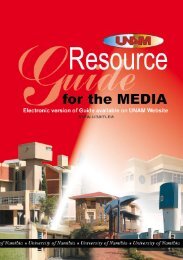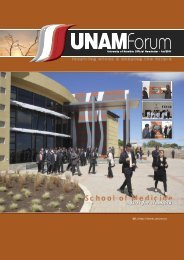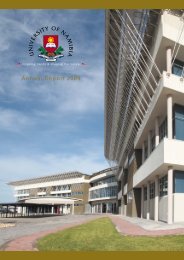UNIVERSITY OF NAMIBIA CENTRE FOR EXTERNAL STUDIES ...
UNIVERSITY OF NAMIBIA CENTRE FOR EXTERNAL STUDIES ...
UNIVERSITY OF NAMIBIA CENTRE FOR EXTERNAL STUDIES ...
You also want an ePaper? Increase the reach of your titles
YUMPU automatically turns print PDFs into web optimized ePapers that Google loves.
DIPLOMA IN PUBLIC RELATIONS13DPPRAimThe aim of the Diploma in Public Relations is to improve skills for those intending to work in public relations, corporate communications,advertising and event planning. The programme will develop para-professional level public relations workers who can either work underqualified professionals in the industry or have the ability to start up their own public relations consultancy companies. Holders of thisDiploma will have abilities and skills in writing, planning special events, office management, speech writing and media law. They will alsohave the capacity for decision-making under pressure as well as the ability to play sub-professional managerial roles.Programme OverviewThe Diploma in Public Relations is a two-year level 5 diploma offered via distance education with a combination of video conferencing,telephone tutoring and vacation school sessions. Distance students would normally take three years to complete the diploma, with amaximum period of four year allowed for completion.This diploma provides introductory training to potential public relations practitioners. It will give them the practical skills required for entrylevel public relations work. Students can then work under qualified professionals in the industry to build on experience or to continuestudies to graduate and then post-graduate level. A distance programme in Public Relations allows current practitioners withoutqualifications to gain a formal qualification without leaving work. It also allows potential students from all over the country to study apopular and dynamic programme and explore the career opportunities it can open for them.Admission requirements A NSSC or equivalent qualification, obtained in not more than three (3) examination sittings, with a minimum score of 22 in five(5) subjects on the UNAM Evaluation Scale English is a compulsory subject and should have been obtained at English as aFirst/Second Language NSSC Ordinary Level, symbol D or higher. A candidate can be admitted to the programme through the University’s Mature Age Entry Scheme.Assessment policyModule assessment is based on continuous assessment by means of written tests, tutor-marked assignments, and practical work, and awritten examination at the end of a module. For modules worth 8 credits, students must submit one assignment of 100 marks, while formodules of 16 credits they must submit two assignments of 100 marks.You will be admitted to the examination on a continuous assessment mark of 40%. To complete the module successfully you shouldobtained a minimum mark of at least 40% in the examination and a final mark of at least 50%. The ratio of the continuous assessmentmark to the examination mark is 60:40. If you failed the first opportunity examination with a final mark between 45 – 49%, then you willbe admitted to the second opportunity examination that will take place in January the following year.Re-admission RulesA student will not be re-admitted into the Faculty if s/he has not passed at least:3 modules (or the equivalent of 48 credits) at the end of the first year of registration7 modules (or the equivalent of 112 credits) at the end of the second year of registration12 modules (or the equivalent of 192 credits) at the end of the third year of registration18 modules (or the equivalent of 288 credits) at the end of the fourth year of registration.CurriculumNOTE:Students are required to do all UNAM English core modules, subject to the exemption guidelines from the Language centre. Studentswho completed English for General Communication are exempted from English Communication and Study Skills, but students who areexempted from English for General Communication are required to do the other two English core modules (LCE3419 and LEA3419).Code Module NQFlevelCreditsPre-/CorequisiteCodePre-/Co-requisite ModuleYear 1 Semester One and Two 32ULEG2410 English for General Communication*, or 4 32206


